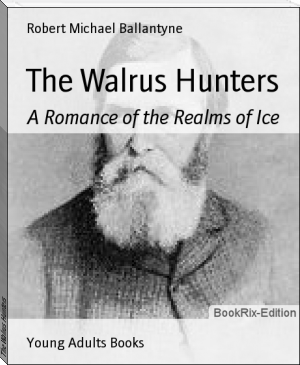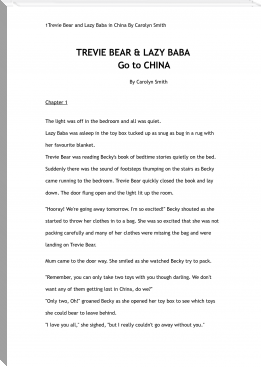The Walrus Hunters - Robert Michael Ballantyne (best book clubs .txt) 📗

- Author: Robert Michael Ballantyne
Book online «The Walrus Hunters - Robert Michael Ballantyne (best book clubs .txt) 📗». Author Robert Michael Ballantyne
Previous to setting out, however, an event occurred which was well-nigh attended with disastrous consequences.
It had been arranged that Cheenbuk and his friends Oolalik and Anteek should keep together in their kayaks, accompanied by an oomiak to carry the game. This woman's boat was to be manned, so to speak, by young Uleeta, Cowlik, and two other girls. Adolay had been offered a place in it, but she preferred going in her own bark canoe, with the management of which she was familiar. Perhaps a touch of national pride had something to do with this preference of the Indian craft. Nootka, who had made several trials of the canoe, was judged sufficiently expert to wield the bow paddle.
While preparations were being made, Adolay and Nootka went to the bay where the canoe was lying--a short distance from the village, on the other side of a high cliff that sheltered the bay from any breeze that might blow in from the sea. The light craft was turned bottom up on the beach, and the two girls carried it down to the water's edge. Launching it, Nootka got in first, and Adolay was preparing to follow when a boyish shout arrested her, and she saw Anteek come skimming round the point in his kayak, wielding his double-bladed paddle with great dexterity and power. In a few seconds the kayak was alongside the canoe and the boy stepped out upon the shore.
"Let me try to steer your canoe," he said, pointing eagerly to the place where the Indian girl was about to seat herself.
Although Adolay did not understand the words, she had no difficulty with the boy's expressive pantomime. She nodded assent cheerfully. Anteek took the paddle, stepped into her place, and the girl pushed them off into deep water.
Delighted with the novelty of their position the two paddled away with great vigour, and were soon a considerable distance from the shore. Then it occurred to Adolay that she would have some fun on her own account, and perhaps give her new friends a surprise. With this intent she floated the kayak and pushed it alongside of a flat stone in the water from which she could step into it. But she found that stepping into a small round hole in the centre of a covered craft was not the same as stepping into her own canoe, and even when, with great care, she succeeded, she found that her garments rendered the process of sitting down rather difficult--not a matter of wonder when we consider that the kayak is meant only for men.
However, she succeeded at last, and grasping the paddle pushed off to sea. But the long paddle with its blade at each end perplexed her greatly, and she had not quite overcome the awkwardness and begun to feel somewhat at ease when she chanced to touch on a ledge of rock that cropped up at that place near to the surface. Fortunately the rock was quite smooth, else it would have ripped up the skin with which the vessel was covered, but the shock and the paddle together were too much for the inexperienced girl. She lost her balance, and next moment was in the water with the kayak bottom up, and she incapable of extricating herself from the hole into which she had squeezed.
It happened that Anteek and Nootka had observed what Adolay was about, and were watching her with interest, so that before the kayak had turned fairly over their paddles dipped with a flash in the water and they rushed to the rescue. And not a moment too soon, for the poor girl's power of endurance was almost exhausted when her friends turned the kayak violently up. This was well, and Adolay drew a long gasping breath; but now the inexperience of the rescuers came into play, for, being ignorant of the cranky nature of a birch-bark canoe, they acted without the necessary caution, the canoe overturned and they all found themselves in the water. This time Adolay managed to wriggle out of her position, but being unable to swim she could only cling helplessly to the kayak. Nootka, equally helpless, clung to the canoe. Fortunately Anteek could swim like a fish, and bravely set to work to push both crafts towards the shore. But they were a long way out; the weight of the two girls made them difficult to push, and, being separate, they had a tendency to diverge in different directions.
After a few vigorous efforts, the boy, perceiving the difficulty and the extreme danger of their position, at once set up a series of yells that awoke sympathetic echoes in the neighbourhood; but he did not for a moment relax his efforts to push his charge towards the shore.
Startled by the sudden outburst of alarming cries, several men ran along shore in the direction whence they came. Foremost among these was the powerful and active Oolalik. On turning the point and seeing what had occurred he plunged into the sea and swam like a dolphin to the rescue. Great was the size of his eyes, and intense the swelling of his heart, when he saw that Nootka was one of the swimmers.
"Take care of Addi-lay and the kayak," he remarked to Anteek as he drew near, "I will look after Nootka and the canoe."
What Nootka felt on hearing these words we cannot tell, but any one might have seen that, despite her unpleasant position, there was a pleased expression on her wet face.
A very few minutes more sufficed to bring them all safe to land, and no one was a whit the worse, but as the girls required a complete change of garments, it was finally decided that the hunting expedition should be postponed until the following day.
CHAPTER FOURTEEN.
IN THE WILD-WOODS AGAIN.
While these events were taking place among the islands of the Arctic sea, the Indian chief Nazinred was slowly pushing his canoe southward in the direction of Great Bear Lake. He was accompanied, as we have said, by three like-minded comrades, one of whom was named Mozwa--or Moose-deer--from some fancied resemblance in him to that uncouth animal.
But Mozwa, although uncouth, was by no means ungenial. On the contrary, he was a hearty good-natured fellow, who always tried to make the best of things, and never gave way to despondency, however gloomy or desperate might be the nature of his circumstances. Moreover, he was a big strong man, full of courage, in the prime of life, and modest withal, so that he was usually rather inclined to take than to give advice--to be led, rather than to lead.
For hours together these men dipped their paddles over the side in concert, without uttering a single word, or giving more than a slight exclamation when anything worthy of notice attracted their attention. The interchange of thought during the labours of the day did not seem to strike them as necessary. The mere being in company of each other was a sufficient bond of sympathy, until an encampment was reached each evening, supper disposed of, and the tobacco-pipes in full blast. Then, at last, their native reserve gave way, and they ventured to indulge a little--sometimes a good deal--in the feast of reason and the flow of soul.
Yet the nature of their voyage was such that white men might have deemed verbal intercourse an occasional necessity, as their route lay through much rugged and wild scenery, where the streams up which they had to force their way were in some places obstructed by rapids and shallows, and a mistake on their part might have brought sudden disaster and ruin. For their canoe was deeply laden with the furs which they had secured during the labours of the past winter, and on the sale of which to the fur-traders depended much of their and their families' felicity or misery during the winter which was to come. But the steersman and bowman understood their work so well, and were so absolutely in accord, that the slightest action with the paddle on the part of either was understood and sympathetically met by the other.
This unity of action is much more important than the navigators of lakes and oceans may suppose. In those almost currentless waters a steersman in any craft is usually self-sufficient, but among turbulent rapids, where rocks and shoals lie in all directions, and the deep-water track is tortuous, with, it may be, abrupt turnings here and there, a bowman is absolutely essential, and sometimes, indeed, may become the more important steersman of the two.
One evening, long after the period when they left their native encampment, the friends paddled their little vessel into the backwater at the foot of a long rapid which roared in foaming white billows right ahead of them, offering what seemed an effectual barrier to their further progress--at least by water--and as the sides of the gorge through which the river rushed were almost perpendicular, without margin and with impenetrable bush everywhere, advance by land seemed equally blocked.
Looking backward, Mozwa gave his friend an interrogative glance. Nazinred replied with an affirmative nod, and, all four dipping their paddles vigorously at the same moment, they shot out into the stream. Almost before the canoe was caught by the current it swung quickly into another eddy, which carried it up a few yards close under the frowning cliffs. Here again the Indians paused, and gazed earnestly at the foaming torrent ahead, which, to an unpractised eye, might have seemed a raging flood, to enter which would ensure destruction.
And indeed the two guides seemed to entertain some such thoughts, for they continued to gaze for a considerable time in silent inaction. Then the bowman threw back another glance; the steersman replied with another nod, and again the canoe shot out into the stream.
This time the struggle was more severe. A short distance above the point where they entered it, a large rock reared its black head in mid-stream. Below it there was the usual long stretch of backwater. To reach the tail of this stretch was the object of the men, but the intervening rush was so powerful that it swept them down like a cork, so that they almost missed it despite their utmost efforts.
"Almost," however, is a hopeful phrase. They were not quite beyond the influence of the eddy when they reached the end of the tail. A superhuman effort might yet save them from being swept back to the point far below that from which they had started. Mozwa was just the man to make such an effort. Nazinred and the others were pre-eminently the men to back him up.
"Ho!" cried Mozwa.
"Hoi!" shouted Nazinred, as they bent their backs and cracked their sinews, and made the big veins stand up on their necks and foreheads.
A few seconds more and the canoe was floating under the shelter of the black-headed rock, and the Indians rested while they surveyed the battleground yet before them.
The next reach carried them right across the river to a place where a long bend produced a considerable sweep of eddying water, up which they paddled easily. Above this, one or two short bursts into the tails caused by nearly sunken rocks





Comments (0)